In El Garaje we were already followers of the music of Polish producers Olivia and Chino before knowing that they were a couple and that they also recorded as Radiation 30376. Arka, their first work together, released by the leading label Pinkman, is a highly recommended album, in which they mix techno, electro and acid. On her own, Olivia has released interesting works such as Sen from this year or Dancing Snake while Chino’s Autostrada is a regular in Dead Violets Night’s DJ case. Today they tell us a bit about their projects both solo and together. On Saturday December 2nd we will be able to attend Radiation 30376 live while on Sunday Olivia will be DJing and Chino will be doing his live set. All this at the Ombra festival, of course.
OLIVIA
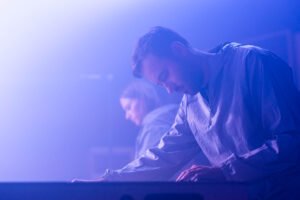 —What got you interested in electronic music and made you start djing? You have been DJing for more than 15 years, right?
—What got you interested in electronic music and made you start djing? You have been DJing for more than 15 years, right?
—I played my first gig when I was 18 so I’ve been a DJ for 19 years. I always loved music, when I was a child, I liked to pretend that I was a singer. I had been listening to music all the time since I was a little child. That’s why I started going to parties when I was a teenager, it’s just in my blood. I can’t imagine myself doing something different. So since I first saw a DJ playing at the party, I just knew I wanted to do the same. My older brother who was also really into music bought turntables and we just started to collect vinyl together and practiced and practiced mixing every day for many hours. It was our obsession.
—Being a DJ, I guess that you got closer to the Polish club scene, so how has changed in these years?
—Oh god!, it changes all the time, new trends come and disappear and come back again. So when I started, d’n’b was a big thing in Krakow, then minimal techno and now fast techno. Anyway, I was always somewhere next to these trends as I was addicted to listening to Intergalactic Fm (in the past CBS Radio was cool). So I was really into electro, the Hague scene, but also Detroit Techno, Neew Beat, EBM and Acid House.
—You said that you have a big vinyl collection. What’s your most precious record?
—Oh, I don’t know. It is a too difficult question. I have so many good records but also a lot I forgot about.
—During the pandemic you said that it was quite difficult to find the vinyls that you liked in Krakow. Have things changed now that vinyls are popular again? Are you going to take advantage of your next visit to Barcelona to buy some records?
—Well, to be honest I never buy much in Krakow. There is now a shop where I can buy stuff which I’m into the most. In Poland I mostly buy in Warsaw in Side One, but every time when I go abroad I go to a record shop and always come back with a bag of new vinyls.
—You said that starting to play live was really refreshing for you and gave new energy to your music life. Do you think it has also changed your way of DJing?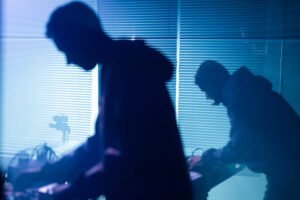
—Yes, after many years being a DJ, I needed to do something more with music, especially when I started hearing in my mind ideas about tracks. For sure it has influenced how I play as I know more about how the tracks are written, the structure and the sound.
—We are quite familiar with your record production, and we enjoyed a lot your Dancing Snakes. Where did you get the idea of mixing these oriental melodies with electro and the desert theme?
—It was just in my mind, I just started jamming with my machines and it came like that. I can’t explain it, I just felt how it should be.
—Last month you released your first LP, what can you please tell us about it?
—The whole record was made during the pandemic. It was a time when I had a lot of time in the studio but also for sleeping. It was a break for touring and sleepless nights. So, I slept a lot. From my childhood I had really intense dreams, which I very often remember very clearly when I wake up. I believe that my subconscious talks to me through dreams. I really like to interpret my dreams. Few years ago, when I suffered from depression for the first time, I talked about my dreams with my therapist and it helped to understand what happened in my mind.
So, the album is the interpretation of my dreams.
—What can we expect of your DJ set at Ombra?
—I think I will play some raw electro, industrial. wave and EBM stuff.
CHINO
—What made you interested in electronic music? Can you please name any producer that has influenced you?
—I grew up in the hip-hop/skate culture of the 90s and later I got really into the graffiti scene. I was watching loads of movies about it. These films were full of classic electro and industrial tunes, but also a wide range of dark and weird electronic tracks. I think that sound pushed me to start making my own music. My influences have changed a lot since then.
In the beginning it was producers like Dj Krush, then I got into the early Warp/Rephlex/Planet Mu and simultaneously all the Detroit stuff like Cybotron, Drexciya, UR. Recently I was really into the sound of An-i, Maoupa Mazzocchetti, Giant Swan, Powell, Black Merlin or Novo Line.
Now I think I’m looking for some kind of a bridge between classic sound and modern approach similar to what i.e., Animistic Beliefs do in their music.
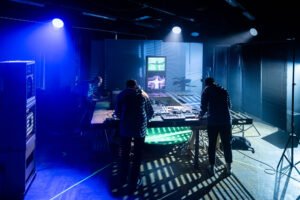 —You appeared in a compilation of Red Bull Music Academy Bass Camp, so I guess you were part of this initiative. How was the experience? It’s a shame that Red Bull is not doing things anymore.
—You appeared in a compilation of Red Bull Music Academy Bass Camp, so I guess you were part of this initiative. How was the experience? It’s a shame that Red Bull is not doing things anymore.
—I was very lucky to participate in the last (20th) edition in 2018 in Berlin. All you do there is connected with music. You can go to one of the crazy equipped studios, hang out with some super nice and talented people from all over the world or jam with some true legends of the scene. One guy from our edition said after the first day in Funkhaus that “It’s a f**king Hogwart of electronic music”. And it really was to be honest.
I wish that everyone connected with the music could experience something like that, so It’s a bit sad that they discontinued it.
—According to your Discogs page, you are into obscure eastern electronics, can you please tell us more about this?
—I find it interesting how the electronic music scene was shaped in the eastern bloc countries. I think there was something very special in the sound. Some very specific flavour of the music that you can find for example on the Ex-Yu Electronica compilations. It was very different to the music that was released in the western countries at that time. Probably because of a totally different political reality but also because of limited equipment that was available behind the iron curtain.
On the other hand you can find some common elements in between east and west. Once my buddy Wiktor Milczarek (Dyktando) noticed that Władysław Komendarek‘s track “Tęsknota Żeglarza” (The Dream of a Sailor) sounds like an extended baroque version of some Drexciya’s track. And it was released a couple years before Drexcyia’s first record appeared.
—Your first records were Early Days and the Duch EP, both more in a Detroit techno/electro style. You are also a lover of 80s drum machines. Was the music of the eighties a big influence at the beginning of your career?
—I was born in the 80s, so everything I heard in the first years of my life was mostly music from that period. In the beginning of my career I was more interested in sample-based sound. Then the interest of 80s drum machines and synths came to me when rediscovering Detroit and Chicago sound.
But I think that the sound of the 80s is deep in my heart. Stuff like huge snares with gated reverb are always welcome in my tracks, but also the early digital or FM synths sound great to my ears.
—From Hiss your music becomes more acid. How did you get into this style? In a way it’s a natural evolution from your first sound.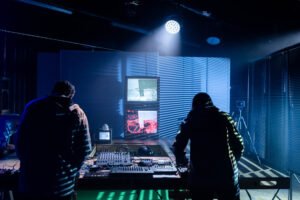
—At the time of Hiss EP my main interest was to record music in the most spontaneous and honest way. I was focused on recording one-take jams on the Tascam Portastudio 4 track tape recorder with no further edition. So it wasn’t necessarily about a particular genre, but the way I record tracks.
I think the acidish part appeared as a side effect when I was jamming and pushing myself to make these loopy jams more interesting and evolving. Tweaking the knobs always gives some acidish touch to the jams in my case.
—Instead with your latest releases you moved in a more Electro and EBM direction. Has living with a DJ influenced your musical evolution? Are you also a record collector?
—I think that Electro was always with me. EBM was also something I liked a lot since a long time. In my case It’s a perfect match of music driven by the bassline which is always a first thing that I look for when writing new tracks with some spontaneously recorded experimental sounds which is the most fun part of making music for me. So it’s a very good balance of something that can be played in the club, but it also smuggles some weird sound experiments to the dancefloor.
Yeah I think living with a DJ is a big influence, how would it be possible to not be one? 🙂 I buy some records from time to time, but I wouldn’t consider myself a record collector.
—Lately you have started DJing too. What made you do this step? How are your sets?
—I was DJing for a while but playing live was always my main interest. Back in the days I used to play live a couple times a week, so I was focused mostly on that. But at the same time, I didn’t finish many tracks because I had to practice and rearrange the live set all the time. At some point I decided to focus more on production and keep the live set for some special occasions. So, I started DJing more often and it was very refreshing for me. With the DJ sets I usually go in very diverse directions.
I have a lot of fun playing music that really inspires me, but at the same time It doesn’t have to fit in some particular genre that my own music could be classified to. I also enjoy playing in many different situations like openings, small bars, ambient rooms or day parties which I missed a bit in the times when I was playing only live.
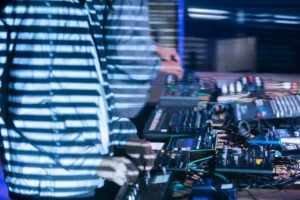 —You also do some posters for parties, what can you please tell us of this other side of you?
—You also do some posters for parties, what can you please tell us of this other side of you?
—I finished studies at the Academy of Fine Arts where I’m also working nowadays. I think that music and art/design were always very connected in my case. The aesthetics of the music videos, posters and record covers inspired what I was doing in my visual works and at the same time also the art/design practice had some very strong impact on my music.
I do a lot of different visual works, but party posters and record covers were always the most fun field that I feel most comfortable in.
—Your last work is entitled Common Oddity. You said that it’s the record you are most happy with. What makes it so accomplished for you? Are you basing your live in this record?
—I’m most happy with it in terms of sound design, composition and finding a personal approach to the issue of writing music. I have a feeling that I found my own way of making music with that EP. It’s a good balance between the free forms of jamming and experimenting with different patches or chain effects with all the studio experience I got during the years and finally I don’t have to sacrifice one for the other.
Yes, my current live is based on all tracks from Common Oddity, but it also contains some old or unreleased tracks reworked in the way I did the last record.
RADIATION 30376
—How did you meet? Was music your first connection?
—We knew about each other through a friend who was studying with one (Olivia) and going to high school with another (Chino). But the first time we actually talked with each other was through myspace (old school internet times haha). Soon it was clear that we liked the same music.
—Your first gig was at Unsound Festival. How was it received? Being an eclectic festival, I guess it’s more difficult to please the audience. Are you followers of the festival?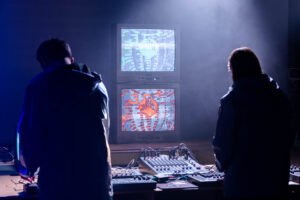
—We’ve been friends with the festival since quite a long time and we’re both residents of Unsound. Mat Schulz (art director of Unsound) told us many times that we should start a live project together, so obviously the premiere of Radiation 30376 was reserved for Unsound, which is a very special thing for us. We can’t imagine a better situation for our first show. The audience is one of the most open minded from all over the world and it’s still in our hometown, where lots of friends are supporting us. It’s still one of our best memories.
—You have been behind the We Are Radar collective for more than ten years. Can you please tell us more about this? You have been organizing parties, right?
—We were making parties for a while when we decided to open our own club and art gallery in Kraków. It was called Radar and it was a 1 year project. We met a lot of people and gathered our own audience around the club. Since then, we’ve been running regular club nights in multiple places all over Poland and also from time to time abroad. The concept is to present the music which really resonates with our tastes, which isn’t necessarily on the main path of popularity. It doesn’t have to be connected with one genre, but usually it’s in the space between club and experimental music.
—With Radiation 30376, according to Discogs, you seek to reflect the startling harshness of the transformation in Poland from communist to the modern situation. How growing in such conditions has influenced your music?
—You have to understand that we’re both from that generation which remember times when one day there was nothing on the shelves in the shops and next there was a tsunami of western goods and culture coming to our reality. It was a very wild and free time which shaped everything in our lives, especially our perception of art. The fact that suddenly we became a part of western reality didn’t mean that we could afford everything we wanted. It was quite the opposite, so our generation had to be very creative. It was also a very harsh and raw time when a big part of our surrounding was ruined by the decay of communist days. This was collided with the shiny artefacts of the western 90’s artefacts. And our music is probably the reflection of this contrast.
—What’s the meaning of the name of the project?
—It’s a mutation of the Radar name but is also inspired by the Chernobyl disaster which was a big thing in our childhood. 30376 is our postal code, which magically contains 303 inside. 🙂
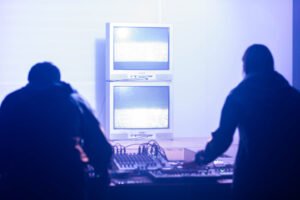 —Both of you have said that you appreciate collaborating with another musician, but how different is working with someone that it’s also your partner? We are also a couple in El Garaje.
—Both of you have said that you appreciate collaborating with another musician, but how different is working with someone that it’s also your partner? We are also a couple in El Garaje.
—Collaboration with another musician is always a great lesson, which gives you another point of view on multiple aspects of creating sound in general.
It teaches you how to deal with your and his/her ego and how to find a common ground/field, which sometimes is far from what you expected from the collaborator. With your partner you’re already in the common field, so it’s much easier to communicate and to do things and play stuff which you could be ashamed of during sessions with another musician. So, for us it’s easier and more comfortable.
—You said that both of you are gear-kind of producers. What kind of gear are you using with Radiation? What are you bringing to Ombra?
—We’re using Octatrack, Digitakt, Tr8s, Microfreak, Blofeld, 2x 303 clones, a few effects, and a microphone. It’s our setup since the beginning so we’re bringing this one to Ombra as well.



